How Therapy Can Help You Heal from Trauma
How Therapy Can Help You Heal from Trauma

If you’ve experienced trauma, you might feel stuck in patterns of fear, anxiety, or self-blame, wondering if you’ll ever truly feel like yourself again. With the right support, therapy can help you understand your pain, reduce distress, and regain control of your life.
But with so many approaches, how do you know which one is right for you? The best therapy depends on your unique experiences, the impact of your trauma, and what feels most comfortable for you. Here are some of the most effective, evidence-based trauma therapies that have helped countless individuals move forward:
Cognitive Processing Therapy (CPT)
Trauma can shape the way you see yourself and the world. You may have internalized beliefs like "I can’t trust anyone" or "What happened was my fault." CPT gently helps you examine these thoughts with compassion, separating the weight of past experiences from your true sense of self. Over time, this process allows you to shift toward a more balanced and self-supportive perspective.
Prolonged Exposure (PE)
When trauma lingers, certain memories, places, or even feelings may feel too overwhelming to face. PE helps you safely and gradually engage with these experiences so that your brain and body can recognize that remembering is not the same as reliving. In a supportive space, you can regain a sense of control and ease the grip that trauma has on your daily life.
Eye Movement Desensitization and Reprocessing (EMDR)
EMDR uses special eye movements or other side-to-side methods to help your brain work through difficult memories. Many people say EMDR turns overwhelming traumatic memories into regular memories that feel like they happened in the past, not like they're happening all over again right now.
Trauma-Focused Cognitive-Behavioral Therapy (TF-CBT)
Designed for children and adolescents, TF-CBT helps young people make sense of their experiences in a way that feels safe and supportive. By combining cognitive-behavioral techniques with trauma-informed care, this approach fosters resilience and empowers young individuals to navigate their emotions with confidence.
Family Therapy
Healing from trauma doesn’t happen in isolation. Family therapy helps loved ones understand trauma responses and create an environment of support, communication, and understanding. When those closest to you are equipped with the right tools, the path to healing can feel less lonely.
Choosing the Right Path for You
There is no one-size-fits-all approach to healing, and the right therapy depends on your personal journey. A qualified therapist can help assess your needs and guide you toward a treatment plan that feels right for you. In many cases, a combination of approaches may be most effective.
If you’re ready to explore your options or simply have a conversation about the next steps, Novissimo Counselling is here to help! Contact us and schedule your first confidential consultation today!







